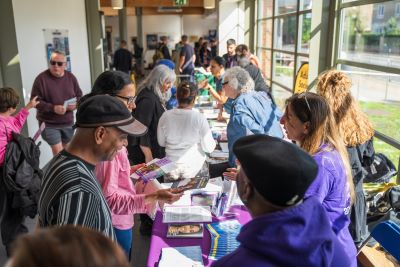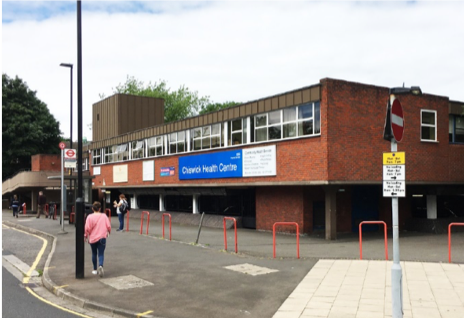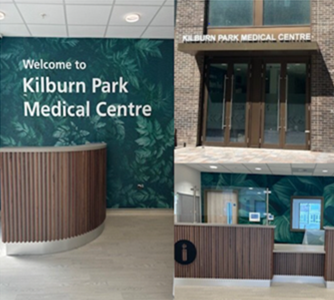|
NW London System Update: September 2025
|
|
|
|
Foreword by Frances O’Callaghan, chief executive
Welcome to the latest NHS North West London update, which is my first as the new chief executive. I am excited to be taking up this new role and look forward to working with partners, colleagues and communities from across all our boroughs.
As you know, I remain CEO of North Central London ICB and will be leading the process of merging the two organisations by next April. This is a complex process and we will keep you updated on progress.
In terms of my approach to leading the ICB, I recognise that partnership working will be key to achieving our goals, including the three shifts set out in the NHS Ten Year Plan – from sickness to prevention, hospital to community, analogue to digital.
When people need health services, I want to ensure their experience is positive. We know that wellbeing makes an enormous contribution to health and we want to work with you to improve the lives of people across our area – particularly those who are experiencing the greatest inequity. To achieve these ambitions, I know how important it is to ensure we hear and understand what community health needs are. We have to know and understand our many, diverse communities and populations. This will drive how we commission high quality services, collaborating with our many local and specialist partnerships to make a real difference.
Our palliative care strategy, covered below, is a great example below of how we can work with the public to improve services. Residents were involved from the outset and had a real impact on our approach, both before and during public consultation. The outcome promises real improvements in care for people nearing the end of their lives
As plans for neighbourhood health continue to progress, it was great to see two of our local teams chosen as part of the first wave of the National Neighbourhood Health Implementation Programme – congratulations to colleagues in Bi-Borough and Hillingdon!
I look forward to meeting those of you I have not yet had the chance to catch up with - and to working with all of you.
Best wishes,
Frances O’Callaghan
Chief Executive
|
|
|
|
Update on the merger and the new name
|
|
When the new ICB is formed in April 2026, we will be known as West and North London ICB. This has been agreed with NHS England after discussion with our new Chair, Mike Bell and neighbouring ICBs.
In terms of merger, we have consulted with the executive directors of both ICBs on a potential executive structure and we will provide a further update once the whole process, including selection, is complete.
We are awaiting national guidance around the funding source of redundancies before developing proposed structures for consultation with our staff – again, we will keep you updated as things progress.
|
|
|
Compassionate care for all: strengthening adult community specialist palliative care in north west London from October
|
Longer hours of care available, more at‑home support, and fairer, more consistent care across north west London —starting in Hillingdon, West London, Hammersmith & Fulham, Central London and south Brent. From October 2025, NHS North West London will begin the phased rollout of Compassionate care for all and the new model of adult community specialist palliative care (CSPC). The first phase extends the availability of community specialist palliative care teams to 8am–8pm, seven days a week, and strengthens “hospice at home” support—so more people with complex needs can get the right help earlier, in the comfort of familiar surroundings. Further phases will follow over the coming months. Find out more. |
|
|
The Government has announced the first 43 locations across the country to launch neighbourhood health services and we are delighted that two of these are in north west London. Hillingdon and Bi-borough will be among the first neighbourhood health services in the country. The announcement comes with funding to develop and rollout this first wave of neighbourhood services, hat will work to tackle health inequalities and improve waiting times. A programme lead will work with existing local services to set up a new neighbourhood health service using General Practice as the cornerstone and draw together a range of professions to develop a ‘neighbourhood health team’. This team will consist of community nurses, hospital doctors, social care workers, pharmacists, dentists, optometrists, paramedics, social prescribers, local government organisations and the voluntary sector – giving people easier access to the right care and support on their doorstep. Find out more. |
|
|
Underpinned by the pioneering “Pentagon Model” (a collaborative health and care team), the Hounslow Bridging Care approach has delivered measurable improvements for older patients on Pathway 1 discharges (those who are medically ready to leave hospital but require short-term support at home). Key outcomes of the model include:
- 18% reduction in Pathway 1 delay days
- 64% of patients aged 65 plus were discharged within 12 working hours
- estimated savings of £248 per discharge (2024/25 data).
Find out more. |
|
|
The three Community Health Pods the Brent Health Matters programme has installed in the borough have been used over 1,000 times, with a Willesden GP Practice already receiving data direct and a another dozen signed up to start receiving readings by the end of September.  The Health in the Park event held at Isleworth Leisure Centre and Library brought together over 500 residents, more than 32 health and community stallholders, and a wide variety of free classes, health checks, and wellbeing activities. The event’s success underscores the power of informal, relaxed settings in building trust between the public, health professionals, and local service providers. Health in the Park offers a unique engagement model, it allows for meaningful dialogue with residents, frontline workers, and voluntary sector partners. Participants can share feedback, discover services they weren’t aware of, and address health inequalities in real time. Stallholders reported high levels of interaction and expressed appreciation for the chance to network with both each other and the public. 71% of resident feedback evidenced increased awareness of new services, and 54% of respondents said they would do something different after learning about it at the event. Stallholders received increased service sign-ups Health checks were delivered throughout the day, and more than 60 visitors enquired about signing up for gym membership. The event contributes to longer-term goals: reinforcing public confidence in the health system, promoting prevention and early intervention, and uncovering unmet needs in the community. Full details of events can be found online. |
|
|
Working with our communities
|
In August, more than 700 residents across North West London took part in community events, from wellbeing days and diabetes workshops to traveller community outreach and maternity support sessions. You can see a summary of our public involvement and community engagement activity here, including some of the issues local people are raising. Find out more. |
|
|
Children and young people
|
|
Work by Public Health to sign schools up to the Asthma Friendly Schools Programme, alongside community engagement from the Children and Young People Brent Health Matters Team and an asthma review enhanced service delivered by GPs has led to a 10% reduction in non-elective admissions to hospital for asthma.
|
|
|
HSJ patient safety awards
|
Congratulations to all our HSJ Patient Safety Award winners from across the NHS in north west London. Winners:
- Central London Community Healthcare Trust - with Brent Health Matters Learning Disabilities Initiative of the Year, recognising their pharmacist-led work to reduce health inequalities
- London North West University Healthcare Trust - Addressing Skin Tone Bias: Inclusive Skin Assessment Initiative.
Highly commended:
- Chelsea & Westminster FT - Using CDSS to improve antimicrobial prescribing and outcomes
- Central London’s Community Health - Tissue Viability team were highly commended for their project addressing skin tone bias in wound care.
Finalists included:
- Central and North West London FT - Home first – Transforming discharge destinations for patients with cognitive impairment following a period of intermediate care
- Imperial College Healthcare Trust - Streamlining Antenatal Consultant led Care from Booking
- Central and North West London Trust - Developing a Clinical Leadership Career Pathway Programme Health and Justice
- Imperial College Healthcare NHS Trust - A Nurse-Led Approach: Transforming Out-of-Hours Blood and Body Fluid Incident Management for 16,000 NHS Trust Staff
- London Ambulance Service Trust - Recognising ineffective breathing during 999 calls
- Central London Community Healthcare Trust - Through Our Eyes - Shaping safer, more effective care through lived experience of Looked After Children
- London North West University Healthcare Trust - How can innovative technology improve medication safety for inpatients with Arginine Vasopressin Deficiency (AVPD)?
- London North West University Healthcare - Quality Improvement Project: Implementing and monitoring the use of ketamine and droperidol in London North West University Healthcare Emergency Departments
- Chiswick Medical Practice - Right Care Right Time - A patient centered digital hub
- London North West University Healthcare Trust - How can innovative technology improve medication safety for inpatients with Arginine Vasopressin Deficiency (AVPD).
- One Community Network - A thriving vibrant and social network supported by CNWL.
|
|
|
 At the beginning of the financial year, the NHS Property Service (NHSPS) led project with Hounslow Council and NHS North West London concluded at Chiswick Health Centre. This involved the rebuild and redevelopment of the existing site, alongside a number of new homes.  The completion of South Kilburn project (Brent) involved the delivery of a new primary care facility in South Kilburn. The new site, based amongst new residential units, replaces outdated and poor quality residential GP estate. The project completed in June 2025 and was co-funded by NHS North West London and Brent local authority, with £1.8m in Community Infrastructure CIL (CIL) funding being secured. The project provides new fit for purpose estate for long-term use in a deprived area of Brent. Drawing on £4.2m of available one-off national funding (plus an additional £1.7m of revenue), NHS North West London Estates are delivering their biggest redevelopment project yet. The programme is working to digitise medical records across 47 practices before converting vacant, already demised GP space to create additional clinical capacity for primary or community care or ARRS role usage. Conversion solutions include introduction of teleconsulting pods, conversion to clinical/examination space or introduction of virtual desks. These works will conclude by December 2025 and are expected to generate over 1 million appointments per annum. In December 2024, North West London ICS approved its Estates and Infrastructure Strategy. This proposes to enable neighbourhood health hub activity, explore opportunities for providing primary care at scale, improve primary care estate, reduce costly void and improve building utilisation. Estates have undertaken a significant piece of work with borough teams, finance and primary care to identify in the region of 80 priority projects to be undertaken across the next five years, underpinned by a costed and agreed revenue pipeline. A business case to progress seven priority projects this financial year is currently working its way through ICB governance for approval to progress to delivery. Estates are also undertaking a number of reconfiguration and refurbishment projects across multiple NHS property company health centres including but not limited to Heart of Hounslow, Heston and The Meadows (Hounslow), St Charles (RBKC), Parkview and Wandsworth Bridge (Hammersmith & Fulham), North Wembley, Stag Lane and Willesden (Brent), Alexandra Avenue (Harrow), Jubilee Gardens and Grand Union Village (Ealing), Soho Square (Westminster), as well as Hesa and Harefield (Hillingdon). The work also aligns with the NHS 10 Year Plan and the proposes left shift of acute services into community settings. In July 2025, North West London ICS along with all Trusts submitted their revised Green Plans to NHS England. The NHS alone contributes to 4% of the UK’s carbon emissions. Our Green Plan has been developed in collaboration with our Trusts and other key representatives from heath care providers across the ICS and London, in addition to our local authorities and other supporting voluntary or third-sector partners. The plan builds on a number of key themes identified in our national and Trusts’ respective green plans. |
|
|
|
|